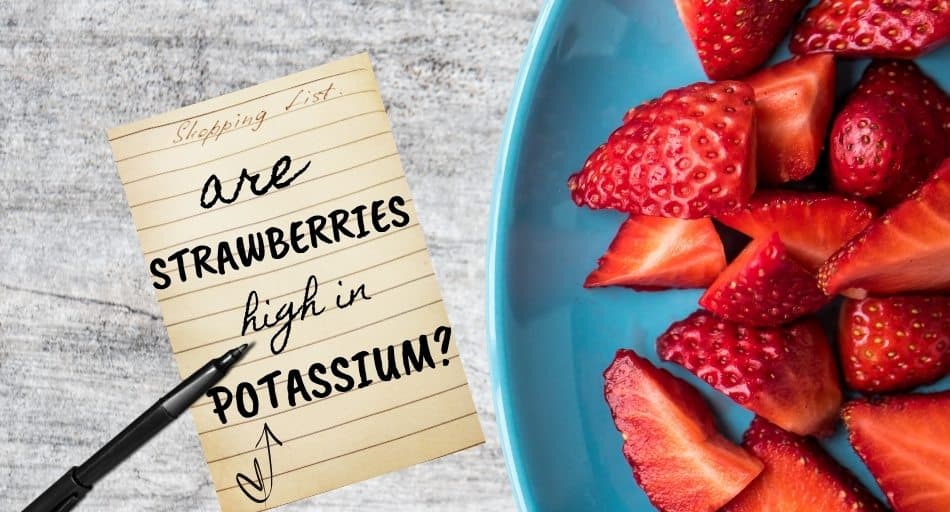Following any diet with specific dietary requirements requires a lot of research and planning. For example, if you need to take in less potassium than the standard recommended dose, you should always choose low-potassium foods, including vegetables and fruits.

These products naturally contain potassium, so you have to control your portion sizes and which foods you choose, as some are higher in potassium than others. For example, are strawberries high in potassium?
Table of Contents
Are Strawberries High In Potassium?
Strawberries are considered relatively low-potassium fruit, so they can be safely added to a kidney-friendly diet. This is because a single serving contains less than 200mg of potassium, so as long as you consume them in small quantities, they won't cause any adverse symptoms. Strawberries are also very healthy and rich in many essential nutrients, minerals, and vitamins.
Furthermore, strawberries are delicious and easy to add to any diet.
How much potassium do strawberries contain?
A single serving of ½ cup of strawberries contains around 125mg of potassium. This means that strawberries qualify as a suitable fruit for a low-potassium diet. They're also incredibly rich in antioxidants and many other nutrients that help you stay healthy and prevent the development of many health conditions.
On top of that, it's okay to consume canned strawberries as well since they're also low in potassium. However, make sure to control your portions since it's easy to overeat berries.
On the other hand, remember that if you consume strawberries as part of a fruit salad, try to choose fruits that are also low in potassium since you can take in more than you think.
Furthermore, a cup of strawberries — which is more like a standard serving for most people — contains twice as much potassium, so be careful not to overindulge.
Are strawberries healthy?
A half-cup serving of strawberries contains approximately 24 calories. This means that they are very unlikely to cause weight gain or other weight-related issues. Strawberries are low in fat and have a good amount of fiber, which helps you feel full after a meal and soak up excess stomach acid, preventing acid reflux.
What's more, fiber feeds good gut bacteria, preventing inflammation and other stomach problems. As a result, adding strawberries to your diet can help you offset these potential risks.
These small berries can also help you lower your blood sugar levels by slowing down your glucose metabolism. This prevents spikes in your blood sugar levels, reducing the risk of type 2 diabetes and weight gain.
It also means that you're less likely to be tired throughout the day since the compounds in strawberries help your body control how much energy is released from the food you consume.
Strawberries are very high in vitamin C, which is an essential water-soluble micronutrient. Also known as ascorbic acid, vitamin C contributes to the growth, development, and repair of all of your cells and tissues.
It also helps boost your immune system and prevent you from getting a cold and other seasonal illnesses. Moreover, vitamin C has many benefits for your skin, keeping it healthy and preventing acne.
Furthermore, strawberries are a good source of manganese. This mineral helps your body form connective tissues, bones, blood clotting factors, sex hormones.
It also plays an important role in how fat and carbohydrates are metabolized and turned into energy that keeps you going throughout the day. So since strawberries are high in this mineral, it's a great idea to include them in your diet.

On top of that, strawberries are loaded with antioxidants that help flush out free radicals out of your body and prevent oxidative damage and stress to your cells. In addition, the particular plant compounds and antioxidants in strawberries have numerous health benefits, particularly for the strength of your heart and cardiovascular system.
Since more and more people these days suffer from heart conditions, it's important to consume foods high in compounds that protect this vital organ.
Are canned strawberries high in potassium?
A half-cup serving of canned strawberries contains around 109mg of potassium. This means that it's safe to consume fresh as well as canned strawberries on a low-potassium diet.
On the other hand, when consuming canned strawberries, try to choose options that aren't loaded with added sugars since most common brands are.
This increases the caloric content and packs in a lot of sugar, which isn't good for your health. Consuming many artificially sweetened foods can increase the risk of type 2 diabetes as well as many weight-related health complications. As a result, it's best to stick to fresh and natural strawberries as much as possible.
Can you take in too much potassium from strawberries?
Since strawberries are considered to be low-potassium foods, it's nearly impossible to consume enough strawberries to cause any uncomfortable symptoms. On the other hand, many people consume more strawberries in one sitting than the recommended serving, so you might need to keep that in mind when snacking on this fruit.
It's crucial to remember that fully avoiding potassium foods isn't healthy as this mineral plays a major role in many metabolic processes. As a result, consuming strawberries is very safe even if your prescribed potassium dosage is low.
In addition, many people consume strawberry shakes and juices, which are higher in potassium and lower in fiber than the natural, fresh fruit. As a result, experts recommend limiting these juices as much as possible if you're sensitive to high potassium levels in foods.
Instead, you can drink fluids and smoothies made with other fruits and veggies that are significantly lower in potassium.
Strawberries are a relatively low-potassium food, which means that they can be safely incorporated into a low-potassium, kidney-friendly diet. Furthermore, they're rich in many nutrients, minerals, and vitamins that help keep you healthy.
Strawberries are high in powerful antioxidants that prevent many health conditions, including certain types of cancer. Therefore, adding these berries to your diet is incredibly beneficial.
Don't know which foods are high in potassium? Read our article, 15 Best Food Sources of Potassium. We also have a guide to this important mineral: Potassium 101: All You Need To Know About Potassium.
